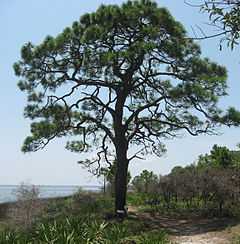Pinus elliottii
| Pinus elliottii | |
|---|---|
 | |
| Conservation status | |
| Scientific classification | |
| Kingdom: | Plantae |
| Division: | Pinophyta |
| Class: | Pinopsida |
| Order: | Pinales |
| Family: | Pinaceae |
| Genus: | Pinus |
| Subgenus: | Pinus |
| Species: | P. elliottii |
| Binomial name | |
| Pinus elliottii Engelm. | |
| Varieties | |
|
Pinus elliottii var. elliottii | |
 | |
| Natural range of Pinus elliottii | |
Pinus elliottii, commonly known as the slash pine, is a pine native to the southeastern United States, from southern South Carolina west to southeastern Louisiana, and south to the Florida Keys.[2]
It is fast-growing, but not very long-lived by pine standards (to 200 years), and prefers humid climates and moist soils.
Slash pine is named after the "slashes" – swampy ground overgrown with trees and bushes – that constitute its habitat.
This tree reaches heights of 18–30 m (59–98 ft) with a trunk diameter of 0.6–0.8 m (2.0–2.6 ft). The leaves are needle-like, very slender, in clusters of two or three, and are 18–24 cm (7.1–9.4 in) long.

The cones are glossy red-brown, 5–15 cm (2.0–5.9 in) in length with a short (2–3 mm or 0.079–0.118 in), thick prickle on each scale. It is known for its conical shape.
It may be distinguished from the related loblolly pine by the somewhat longer, glossier needles and larger red-brown cones, and from longleaf pine by the shorter, more slender needles and smaller cones with less broad scales.
The two varieties are:
- P. elliottii var. elliottii (typical slash pine) ranges from South Carolina to Louisiana, and south to central Florida. Its leaves are in bundles (fascicles) of twos and threes, mostly threes, and the cones are larger, 7–15 cm (2.8–5.9 in).
- P. elliottii var. densa (South Florida slash pine or Dade County pine) is found in the pine rocklands of southern Florida and Florida Keys, including the Everglades.[3][4] Leaves nearly all in bundles of two. Cones smaller, 5–12 cm (2.0–4.7 in).
Unlike the typical variety of slash pine, seedlings of P. elliottii var. densa pass through a "grass stage", in a manner similar to longleaf pine.
The slash pine also is known as the yellow slash pine, swamp pine, or pitch pine, although it should not be confused with the tree more usually called the pitch pine, Pinus rigida.
This tree is widely grown in plantations, and also is used in horticulture.
References
- ↑ Conifer Specialist Group (1998). Pinus elliottii. 2006. IUCN Red List of Threatened Species. IUCN 2006. www.iucnredlist.org. Retrieved on 10 May 2006.
- ↑ Moore, Gerry; Kershner, Bruce; Craig Tufts; Daniel Mathews; Gil Nelson; Spellenberg, Richard; Thieret, John W.; Terry Purinton; Block, Andrew (2008). National Wildlife Federation Field Guide to Trees of North America. New York: Sterling. p. 74. ISBN 1-4027-3875-7.
- ↑ "Pine Rocklands" (PDF). United States Fish and Wildlife Service. Retrieved 2009-06-17.
- ↑ Gilman, Edward F.; Dennis G. Watson (2006). "Pinus elliottii: Slash Pine". University of Florida, Institute of Food and Agricultural Sciences. Retrieved 12 April 2011.
External links
-
 Media related to Pinus elliottii at Wikimedia Commons
Media related to Pinus elliottii at Wikimedia Commons -
 Data related to Pinus elliottii at Wikispecies
Data related to Pinus elliottii at Wikispecies
